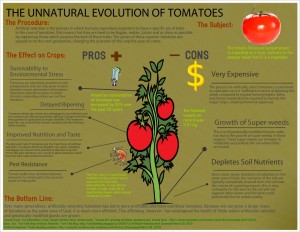THE UNNATURAL EVOLUTION OF TOMATOES
The Pri,
The Subject:
Artificial selection is the process in which humans reproduce organisms to have a specific set of traits.
In the case of tomatoes, this means that they are bred to be bigger, redder, juicier and as shiny as possible
by replanting those which possess the best of these traits. The genes of these superior tomatoes are
passed on to the next generation, changing the outcome of the crop for years to come.
The Effect on Crops: PROS -I-
– CONS
Survivability to
Environmental Stress Very Expensive
Tomatoes are extremely sensitive to cold
temperatures and can only grow in warm The process to artificially select tomatoes is extremely
climates; newer generations of tomatoes to cultivators as it is inefficient in terms of planting the
have been selected to grow in cooler
climates, expanding where we ran farm seeds compared to regular farming habits. Extra
tomatoes, machinery would also be required to harvest the
larger crops, creating immense expenses.
Delayed Ripening
Tomatoes which rioe slower are advantageous to cultivator and
the commercial seller because they will have a longer time from
being picked to going bad la longer shelf life). This improves
both the size at which the tomato is picked and the freshness Growth of Super-weeds
of the tomato.
The use of genetically modified tomato stalks
Improved Nutrition and Taste has led to the growth of super-weeds in those
regions. These super-weeds are immune to
The physical traits of tomatoes are the mar, focus of artificial herbicides and pollute the soil where they
selection. Tomatoes which are brighter red,uicier, healthier are found.
and bigger are chosen to be planted so the new crop will
mirror the best tomatoes, It is crucial to plant tomatoes which
have the best color and best nutnents,
Depletes Soil Nutrients
Pest Resistance
Tomato stalks have developed greater Since more, larger tomatoes are planted on the
immunity to certain pests, this prevents same area of land, the nutrients of the soil are
losses to help profit. typically completely drained from the soil over
the course of a growing season; this is very
unhealthy for the land as the soil will not
support other plants and the land could
potentially lose its arable quality.
The Bottom Line:
Over many generations, artificially selecting tomatoes has led to more profi utritious tomatoes. Because we can grow a larger mass
of tomatoes on the same area of land, it is much more efficient. This efficier, is endangered the health of fields where artificially selected
and genetically modified plants are grown,
‘Tomato Facts, Fun Information, trivia. tomato nutrition facts. tomato foods: Tomato Dirt growing tomatoes. gardening tips. tomato facts . httpiilwww.tomatodirt.com/tomato-facts.html [accessed April start
Suico. Van farms Bio Nog: Artificial SeleCtion: Turf s Bra Btog. http://yUrisbioblog.hlogspot.ca/2009/ 12/artificial-selection.html (accessed March 29. 2013
“Artificial Selection: Understanding evolution. 50pi//evolution.berkegy.edu/evolibrary/article/evo_30 (accessed March 29. 2013).
